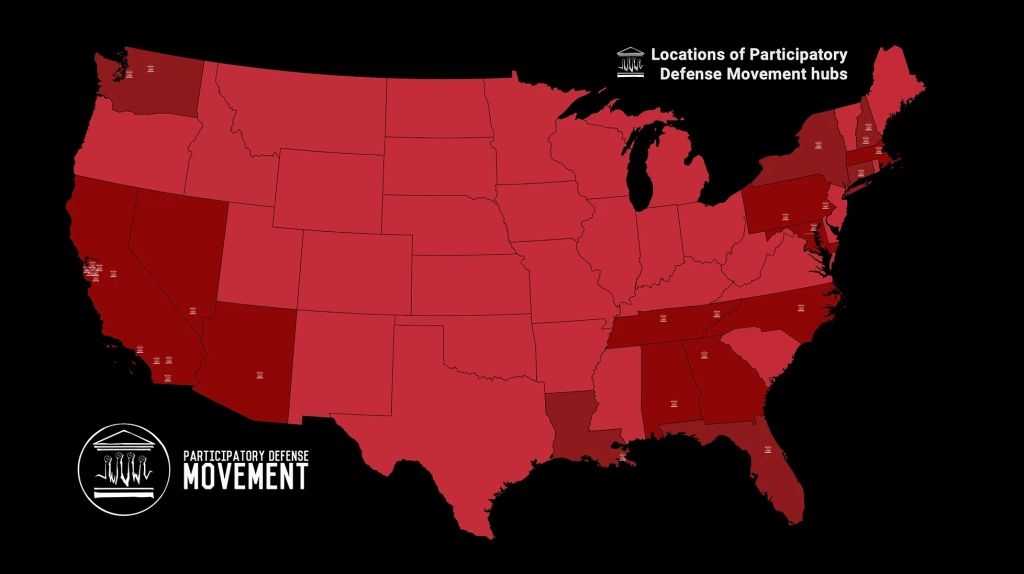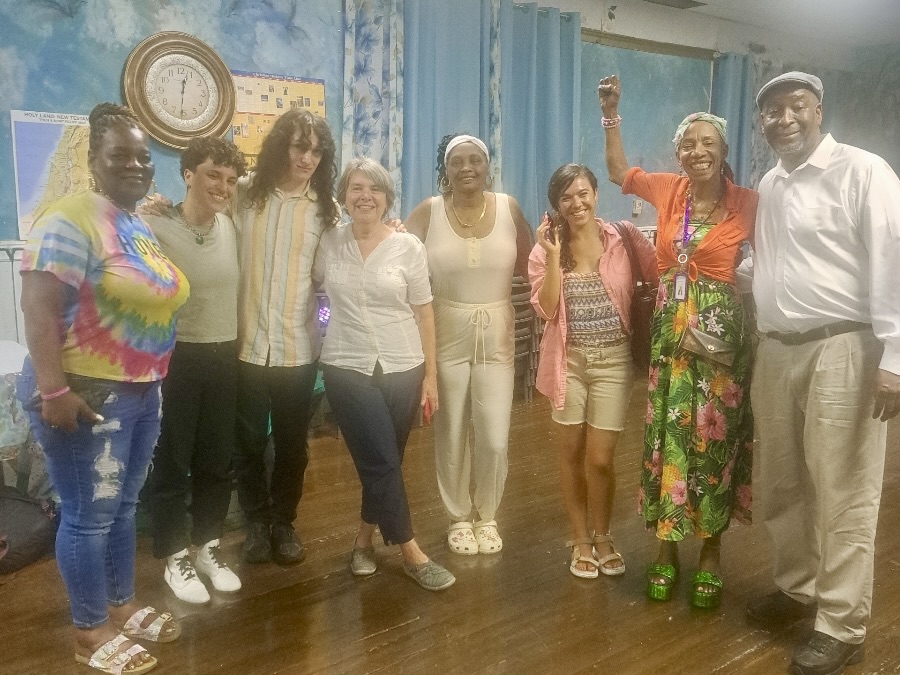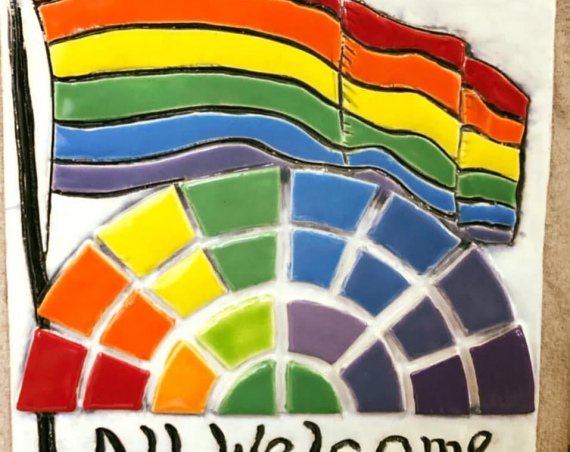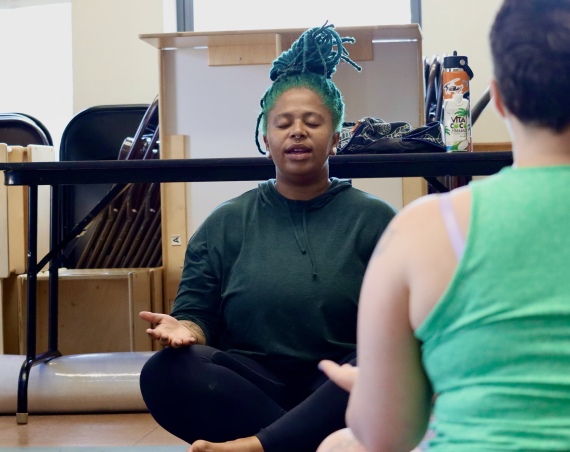
National Participatory Defense Hub locations. (Participatory Defense Network)
In November 2021, West Philly resident Michelle Doughty was charged with attempted murder as she fought her way out of what she describes as an abusive relationship. Doughty wasn’t sure what to expect or do next, so she took her aunt’s advice to connect with the West Philly Participatory Defense Hub (PDH).
“I wasn’t hopeful at all being charged with something like attempted murder,” said Michelle Doughty. “I actually didn’t know if the Hub could actually help me, but they proved me wrong.”
Doughty says the West Philly hub provided her court support, legal advice, and emotional support throughout her six-month journey, in which she represented herself until her case was resolved. Her charges were dropped in February 2022. Because of her experience with the hub, she decided to pay it forward, become a member, and assist others in Participatory Defense.
“It transformed my life in a positive way. That’s why I decided to be there and give others support.”
Participatory Defense is a community-organizing model in which networks of people help others, or their family members, navigate the criminal justice system to improve the outcome of their cases. The hubs comprise people who “come from all different walks of life,” says North Philly PDH member Martha Williams. PDH members do this volunteer-led work in their free time.
PDHs received broader notoriety in 2018 when Raj Jayadev worked to have the model adopted for Philly’s juvenile justice system while he was a Stoneleigh Fellow with the Defender Association of Philadelphia. Stoneleigh Fellows are given funding to transform systems that serve the youth.
Some members, like Doughty, come looking for support and later become members, while others are lawyers looking to lend their expertise. But anyone wanting to support their neighbors could become a member. “We have housewives. We have some people who work in different branches of government and people who have went through court cases, such as myself,” said Doughty.
PDHs work under the philosophy that everyone deserves support. While typically, most organizations operate in favor of the perceived victim,
PDH’s support isn’t contingent on whether they believe a person is innocent or guilty – nor do they make that call.

Members of the West Philly Participatory Defense Hub. (West Philly Hub)
Terrell Harris, another member of the West Philly PDH, says this framework is vital as someone who also gained support from the PDH before joining. “[Support is] essential. When you’re going in [the courtroom], you shouldn’t have to go in there by yourself.”
Harris said being perceived as “guilty” before being charged is challenging. “When [the court] accuses me of something, [they] take my time, my money, and my reputation,” he says. “And people don’t believe you. And it’s an infrastructure and language that I don’t understand. But this person (a PDH member) and the people I have with me can help me gain a better understanding. So why shouldn’t I be able to fight? Why shouldn’t I be able to call on my community?”
As Harris mentions, it can be challenging to understand court terminology, so court support is a core service PDHs provide. This typically looks like members escorting someone to the courtroom but can go beyond.
He says being in the courtroom can be anxiety-inducing. Having members walk through the process and lend sentiments from similar experiences after you step outside the courtroom is very helpful. It heightens the transparency, allowing a person to clearly understand where they are, the potential outcomes, and what they should discuss with their legal counsel.
Social bios are another integral part of PDH services, essential to building resilience and humanizing the alleged party in a court case. They are digital compilations, usually videos, detailing who a person is. PDHs share these social bios with lawyers, who will present them to judges and district attorneys alongside someone’s record. This allows the judicial side of the case to know the alleged party as a person and not just their charges.
“It’s all the good things highlighting a person because when a judge is listening to a case, they’re listening to the worst things about this person,” Harris says. “We also present social bios in a video form so folks can just press play instead of having to read through all the letters.”
PDHs offer a variety of services to people, and these services can be different based on location. While they are on hiatus through the end of the summer, the Youth Art and Self-Empowerment Project (YASP) usually hosts their own youth-specific participatory defense hub. Harris shares that the West Philly PDH also often assists people with family court cases, while Williams shares that the North Philly PDH partners with other community organizations to connect people with the resources they need if they cannot.
While court support and resource-sharing are vital for those who come to the hubs, members say the emotional support helps them the most.
Williams shares her point of view, saying, “Because I had to travel that road, my experiences of how scary and uncertain and not knowing what to do come into play. There was somewhere that I could go just to get the support I needed sometimes just to make it through to the next day. It was very important.” Williams joined the North Philly Defense Hub when her son was charged with murder. While he’s currently serving time, she remains with the hub to lend her knowledge.
Doughty says she already suffered from depression, so the charges made her feel worse. But she says being able to speak with folks, sometimes just venting, really made a difference. “It transformed my life in a positive way. That’s why I decided to be there and give others support. We get thanked a whole lot by people who just want to talk. They call certain people from the group, maybe when they’re going through some emotions about their upcoming case, and we sit on the phone and talk to them.”
“Seeing is believing,” says Harris, discussing how support from the West Philly hub has impacted him. “At first, I felt in debt. But then when I saw the heart and nature of the people, it’s like, alright, it’s not a hobby, but their way of giving back to the community.”
Doughty reasserts the nature of this work, saying, “I think everybody needs that support, whether they’re a victim or perpetrator — and it’s not up to us to make a judgment. It’s our job to support them.”
There are several hubs around the city, including one in the neighborhood. While the Germantown Info Hub couldn’t speak to someone from the Germantown hub, we previously did a radio interview with member Margaret Robertson. Below is a list of citywide hubs, contacts, and meeting times pulled directly from the website. To learn more about Participatory Defense, visit www.phillydefenders.org.
Best Outcomes Hub
Tuesdays: 6-8 p.m
Zoom: https://us04web.zoom.us/j/7633071948
Mothers In Charge
2839 W. Girard Ave., 1st Floor, 19130
Info: (215) 228-1718
South Philly Hub
Mondays: 6:30-8:30 PM
Zoom: bit.ly/defensehub
Circle of Hope Church
2212 S. Broad Street, 19145
Info: (484) 440-9560
facebook.com/southphillydefensehub
West Philly Hub
Thursdays: 6:30-8:00 PM
Meeting In-Person Every Week
Elmwood Community Methodist Church
4523 Chester Avenue, 19143
Available via oom
Zoom: bit.ly/westphillyhub
Dial in: +1 929 205 6099 (ID 842 2802 3552)
Info: (929) 205-6099
westphillydefensehub@gmail.com
Instagram: @westphillyhub
Germantown Hub
Wednesdays: 5:30 PM
Zoom: https://us02web.zoom.us/j/84736646065
Janes United Methodist Church
47 E. Haines Street, 19144
Info: (267) 277-3117
Youth Hub
Tuesdays: 4:30-6:30 PM
Zoom: https://zoom.us/j/691514592
Youth Art & Self-Empowerment Project
924 Cherry Street, 5th Floor, 19107
Info: (267) 571-9277
North Philly Hub
Thursdays: 6:30-8:00 PM
Zoom: https://us02web.zoom.us/s/81692560760
Zion Baptist Church
3600 N. Broad Street, 19140
Info: (267) 571-9365
northphillyhub@gmail.com
Haddington Hub
Tuesdays: 6:00-8:00 PM
260 S. 51st Street, 19139
Text To Join Virtually
Call/Text: (215) 784-7103
Instagram: @HaddingtonHub
Kensington Hub
Mondays: 6:00-7:30 PM
Esperanza Health Center
861 E. Allegheny #200, 19134
Info: (267) 279-9373
kensingtonhub@gmail.com


